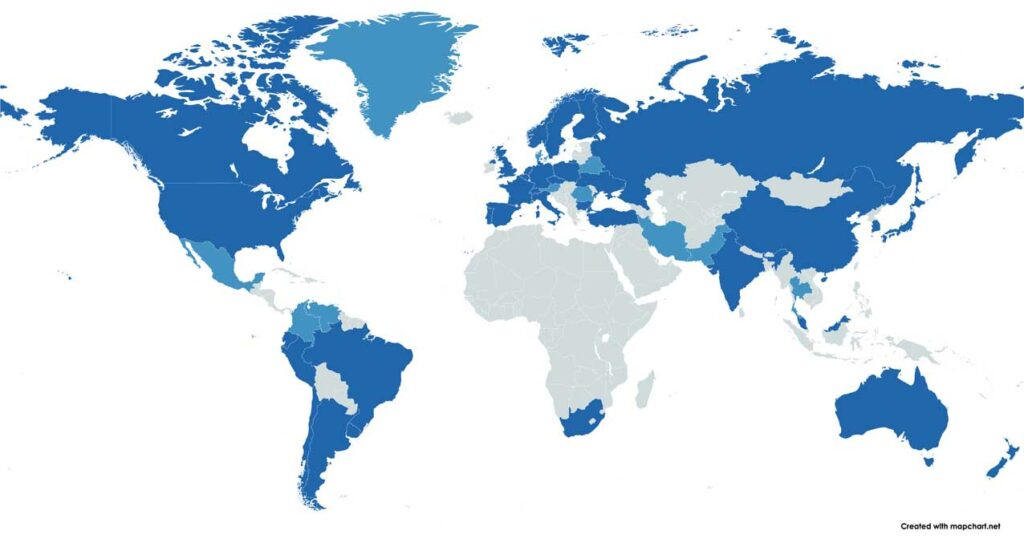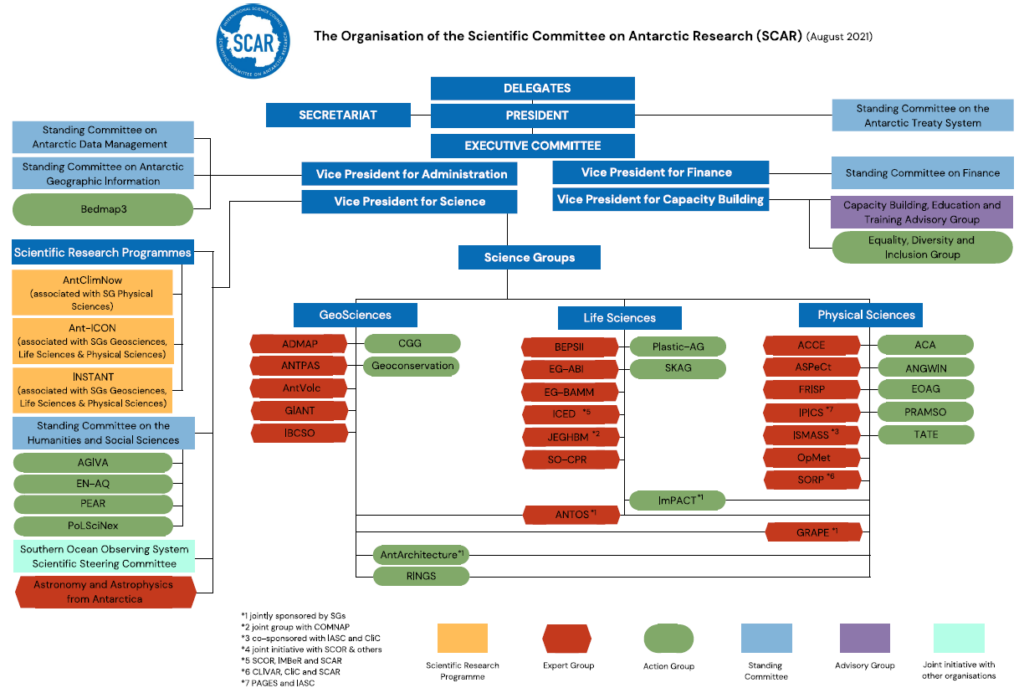Antarctica and the Southern Ocean play such an important role in the Earth system that Antarctic research is essential for ensuring a sustainable future. SCAR‘s vision is to create a lasting legacy for Antarctic science and knowledge to provide a more sustainable future for our planet.
SCAR strives to establish a more complete and detailed understanding of the most critical elements of Antarctic and Southern Ocean physical, chemical and biological systems, and how they are interconnected. Facilitating international cooperation, coordination, and partnerships is essential to achieving this vision.

SCAR’s 7 main objectives for 2023 – 2028
1. Promote SCAR’s leadership in science
Strengthen and expand high-quality, collaborative, visionary and societally relevant research through international partnerships while addressing urgent global priorities including climate change and biodiversity:
- reducing uncertainty in the projections of the contribution of the Antarctic Ice Sheet to global mean sea level rise;
- continuing to explore how processes in lower latitudes influence and feedback to the southern polar regions and vice versa;
- encouraging national Antarctic programs to support research in such topics, as well as in terrestrial and marine biodiversity at the population, species, and community levels.
2. Provide independent scientific advice
- Provide independent scientific advice to the Antarctic Treaty System (ATS) and other international bodies in response to science and knowledge needs identified by policymakers.
- Continue to bring to the attention of policymakers to expected changes in the Antarctic and the Southern Ocean and communicating the urgency of the need for additional research to narrow uncertainties about cryospheric change, its rate, and the implications for society.
3. Data access
Encourage and facilitate unrestricted and free access to Antarctic research data and samples in support of all the above objectives.
4. Research capacity
Enhance and expand research capacity in SCAR’s member countries, recruit new members, and encourage the support of research that addresses the above imperatives.
5. Communication
Increase and improve public awareness and understanding of Antarctic issues and the essential role of Antarctica and the Southern Ocean in the Earth’s climate system: Communication of the outcomes of Antarctic and Southern Ocean climate change-related research with an emphasis on why this research is essential for policymakers and informed environmental conservation, protection, and management.
6. Diversity
Ensure equality, diversity, and inclusion (EDI) principles are applied to all of SCAR’s activities and actions, including SCAR’s management, structure, and the realization of its missions and vision.
7. Sustainability
Encourage carbon footprint reduction in SCAR’s research activities and SCAR meetings, and continuously monitor conformity to the ISC’s Sustainability Principles.
Find the complete strategic plan of 2023-2028 here.
The SCAR – Newsletter informs about new activities.
Organization
SCAR is an international non-governmental organization of the ISC family (ISC= International Science Council), and develops, coordinates, and promotes international research in Antarctica and the Southern Ocean, and in the role of Antarctica in the Earth system.
SCAR is also a scientific advisor to Antarctic Treaty Parties and other organizations such as UNFCCC and IPCC on science and conservation issues affecting Antarctica and the Southern Ocean.
Successful collaboration of Antarctic research began in the International Geophysical Year 1957/58. Subsequently, SCAR was founded in February 1958 to continue the collaboration with a permanent international forum.
The Federal Republic of Germany signed the Antarctic Treaty in February 1979 and has been a member of the Consultative Round since March 1981. SCAR recommendations become binding on member countries when they have been adopted by the Antarctic Treaty Consultative Round.
The organization is headed by the SCAR Executive Committee, chaired by SCAR President Prof. Gary Wilson (New Zealand). The SCAR Secretariat is located in the Scott Polar Research Institute in Cambridge, UK (Executive Director Dr. Chandrika Nath).
As part of SCAR, there are:
Permanent scientific working groups:
- Science Group GeoSciences
- Science Group Life Sciences
- Science Group Physical Sciences
Diverse specialised subgroups (Expert Groups, Action Groups, Advisory Groups), which cover various scientific needs.
Scientific Research Programmes:
Since 2021:
- AGATA (Antarctic Geospace and ATmosphere reseArch)
- AGE (Antarctic Geological Evolution) Program Planning Group
- C-CAGE (Changes in Circumpolar Antarctic Gradients in Ecosystems) Program Planning Group
- Integrated Science to Inform Antarctic and Southern Ocean Conservation (Ant-ICON)
- INStabilities and Thresholds in ANTarctica (INSTANT)
- Near-term Variability and Prediction of the Antarctic Climate System (AntClimnow)
2012 – 2020:
Standing Committees:
- Standing Committee on the Antarctic Treaty System (SCATS)
- Standing Committee on Finance (SC-Finance)
- Standing Committee on Data and Information Management (SCADM)
- Standing Committee on Antarctic Geographic Information (SCAGI)
- Standing Committee on Humanities and Social Sciences (SC-HASS)
SCAR holds an Open Science Conference every two years.
2004 Bremen, Germany
2006 Hobart, Tasmania/Australien
2008 Joint SCAR – IASC – IPY Open Science Conference, St. Petersburg, Russia
2010 Buenos Aires, Argentina
2012 Portland, Oregon, USA
2014 Auckland, New Zealand
2016 Kuala Lumpur, Malaysia
2018 Joint SCAR – IASC OSC (POLAR 2018), Davos, Switzerland
2020 Online due to the COVID-19 pandemic
2022 Online due to the COVID-19 pandemic (01.08 – 10.08.2022)
2024 Pucón, Chile
